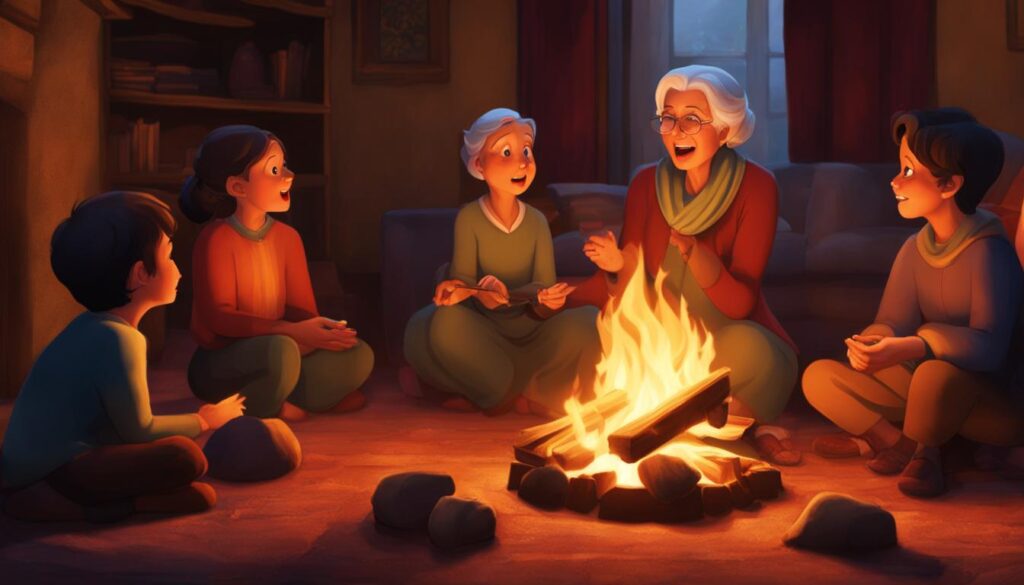We may earn money or products from the companies mentioned in this post.
Ancestral storytelling is an ancient practice that has been passed down through generations. Through the telling of stories, ancestral lineage is illuminated, and individuals can connect with their ancestors in a profound way. This art form revives history and brings it to life, providing a deeper understanding of cultural heritage and fostering a sense of identity.
From oral traditions to written records, ancestral storytelling techniques have evolved over time. Today, digital storytelling has become a popular way to preserve and share ancestral stories. Regardless of the format, the benefits of ancestral storytelling are numerous, including strengthening family bonds, providing personal growth opportunities, and offering a sense of belonging.
Key Takeaways
- Ancestral storytelling connects individuals with their ancestors and roots.
- Techniques for sharing ancestral stories have evolved over time, including oral traditions, written records, and digital storytelling.
- Ancestral storytelling provides numerous benefits, including fostering a sense of identity, strengthening family bonds, and offering personal growth opportunities.
- Ancestral storytelling traditions from around the world showcase unique cultural practices and storytelling formats.
- Engaging in ancestral storytelling practices, such as conducting research and interviewing family members, can help individuals effectively tell their ancestral stories.
Understanding Ancestral Storytelling Techniques
Storytelling is an ancient and powerful art form that has been used for generations to pass down history, traditions, and knowledge from one generation to the next. Ancestral storytelling, in particular, is a unique way to connect with one’s heritage and preserve familial and cultural histories. Below, we explore several ancestral storytelling techniques that have been used throughout history:
Oral Traditions
Oral traditions are one of the oldest forms of storytelling and have been used by many cultures throughout history. This technique involves sharing stories through spoken word and passing them down through generations. Oral traditions are an essential way of preserving cultural history while also allowing storytellers to add their own interpretations and personal touches to the stories.
Written Records
Written records are another common way of preserving ancestral stories. From journals to diaries, written records provide a rich and detailed account of a family’s history and traditions. These records also provide insight into the cultural and social norms of the time, allowing future generations to understand the context in which their ancestors lived.
Genealogical Research
Genealogical research involves tracing and documenting one’s family history and ancestry. This technique involves piecing together information from various sources such as birth certificates, marriage licenses, and other legal documents. Genealogical research allows individuals to understand their family’s origins, migration patterns, and gain insight into the lives of their ancestors.
Digital Storytelling
Digital storytelling is a modern adaptation of ancestral storytelling that uses technology to create multimedia stories. This technique can involve combining audio or video interviews with photographs, documents, and other artifacts. Digital storytelling allows families to create dynamic and interactive stories that can be easily shared and preserved for future generations to enjoy.
“Ancestral storytelling is not just about preserving history, it’s about connecting with one’s heritage and understanding our place in the world.”
The various techniques used in ancestral storytelling all serve the same purpose – to preserve and pass down history and traditions from one generation to the next. By understanding the different techniques, individuals and families can create their unique ancestral storytelling traditions, ensuring their ancestors’ legacies are kept alive.
The Benefits of Ancestral Storytelling
Engaging in ancestral storytelling provides numerous benefits that not only contribute to our personal growth but also strengthen family bonds, foster a sense of identity, and provide a deeper understanding of cultural heritage. Here are some of the significant benefits of ancestral storytelling:
1. Strengthening Family Bonds
Storytelling is a powerful tool for strengthening family bonds because it allows family members to connect with each other on a deeper level. It helps to build a sense of shared history, provides a space for mutual reflection, and allows for the passing down of family values and traditions from one generation to the next.
In a study conducted by Emory University, researchers found that families who regularly share stories and discuss family history have stronger emotional bonds and higher levels of resilience, which is particularly helpful in times of crisis.
2. Developing a Sense of Identity
Ancestral storytelling can provide individuals with a sense of identity and belonging. By learning about their family history, individuals can gain a better understanding of their cultural heritage, values, and traditions. This can help them feel more connected to their roots and provide a greater sense of purpose and direction in their lives.
3. Personal Growth and Self-Reflection
Ancestral storytelling can offer valuable opportunities for personal growth and self-reflection. By exploring their family history, individuals can gain insights into their own personality traits, strengths, and weaknesses. This can provide a greater sense of self-awareness, which can aid in personal development and self-improvement.
4. Preserving Cultural Heritage
Ancestral storytelling is an essential tool for preserving cultural heritage. By sharing stories and passing down traditions, individuals can help maintain cultural diversity, and ensure that traditions and values are not lost over time. This is particularly important for marginalized communities and minority groups.
5. Enhancing Communication Skills
Engaging in ancestral storytelling can enhance communication skills. By sharing stories with others, individuals can develop their ability to articulate their thoughts and feelings more effectively. This can help improve their communication skills in other areas of their lives, such as personal and professional relationships.
Overall, ancestral storytelling offers a wealth of benefits that can enrich our lives and deepen our understanding of our cultural heritage. By engaging in this art form, we can honor our ancestors, connect with our roots, and preserve our family history for future generations.
Exploring Ancestral Storytelling Traditions
Storytelling has been a fundamental part of human culture for centuries, and each community has its unique way of passing down wisdom from one generation to another. Ancestral storytelling is no exception and is deeply rooted in the traditions of various cultures around the world. Let’s take a closer look at some of these traditions:
Aboriginal Dreamtime Stories
The Aboriginal people of Australia have preserved their cultural heritage through Dreamtime stories. These stories teach important lessons and share knowledge about the natural world and the creation of the universe. Dreamtime stories are often accompanied by traditional music and dance, making them rich, multi-sensory experiences that engage the listener’s imagination.
Balinese Shadow Puppetry
Balinese Shadow Puppetry, also known as Wayang Kulit, is a form of storytelling that uses intricately designed puppets with articulated limbs to act out epics, myths, and religious stories. Puppeteers use their skill to bring the puppets to life and create a magical atmosphere that transports the audience to another world.
Irish Seanchaí
The Irish have a rich tradition of storytelling, and the Seanchaí is a revered figure in Irish culture. Seanchaís are storytellers who keep the history and folklore of their community alive through their tales. They often recite their stories in public houses and local gatherings, creating a sense of community and connection through the shared experience of storytelling.
Native American Oral Traditions
The Native American tradition of oral storytelling has been passed down for generations. These stories celebrate the natural world, ancestors, and the importance of community. Oral storytelling is considered a sacred act, and the stories are told with reverence, often accompanied by music, dance, and other rituals.
Chinese Shadow Play
Chinese Shadow Play, also known as Piyingxi, is a form of storytelling that is popular in many parts of China. It uses intricate cutouts made of leather or paper and illuminated by a light source to cast shadows on a screen. The play often features mythical creatures, folk tales, and historical events. The stories are accompanied by music and dialogue, creating a mesmerizing experience for the audience.
“The art of storytelling is not simply about relaying information; it’s about creating a connection with the listener and invoking their imagination.”
These are just a few examples of the diverse traditions of ancestral storytelling that exist around the world. They demonstrate how storytelling has been used as a tool to keep history alive, connect people with their roots, and foster a deeper understanding of cultural traditions. By learning about these traditions and incorporating their practices into our own storytelling, we can continue to honor our ancestors and enrich our own lives through the art of ancestral storytelling.
The Importance of Ancestral Storytelling
Ancestral storytelling is not just a way to recount the tales of our ancestors; it also plays a crucial role in preserving history and cultural heritage. By sharing our ancestral stories, we keep the legacies of our ancestors alive and pass down important cultural traditions to future generations. Through storytelling, we can understand and appreciate the struggles and triumphs of those who came before us.
There are numerous benefits to engaging in ancestral storytelling. One of the most significant benefits is the preservation of cultural heritage. Ancestral stories often contain elements of cultural practices and beliefs that have been passed down through generations. By sharing these stories, we ensure that these traditions are not lost and can continue to be passed down to future generations.
Another benefit of ancestral storytelling is the sense of identity and belonging it can provide. By learning about our family’s past, we can gain insights into our own identity and better understand our place in the world. This understanding can lead to a greater sense of belonging and connection with our family and community.
Furthermore, ancestral storytelling can strengthen family bonds. When we share family stories, we build a sense of intimacy and closeness with our loved ones. We can also learn more about our family members and their experiences, fostering deeper relationships and empathy.
Lastly, engaging in ancestral storytelling can offer personal growth and self-reflection. By examining our family’s history, we can gain insights into our own lives and patterns of behavior. Storytelling can also provide opportunities for reflection and healing, allowing us to come to terms with difficult experiences or emotions.
Practices for Engaging in Ancestral Storytelling
Engaging in ancestral storytelling can be a deeply rewarding and enriching experience. Here are some practical tips for those interested in exploring this art form:
- Conduct Research: One of the most important steps in ancestral storytelling is conducting thorough research. This can involve gathering information about your family history, cultural traditions, and folklore.
- Interview Family Members: Reach out to family members and conduct interviews to gain further insights into your family’s ancestral stories. This can also provide an opportunity to connect with loved ones and strengthen family bonds.
- Create Personal Narratives: Personal narratives are an excellent way to share ancestral stories. They allow you to personalize the stories and connect them to your own experiences and perspective.
- Utilize Modern Technology: Modern technology provides new possibilities for ancestral storytelling. Experiment with digital storytelling tools, such as podcasts and videos, to share your ancestral stories with a broader audience.
- Attend Cultural Festivals and Events: Attending cultural festivals and events can provide inspiration and introduce you to new forms of ancestral storytelling. Take advantage of these opportunities to learn from other cultures and traditions.
Remember, engaging in ancestral storytelling is a personal and unique experience. Experiment with different practices and find what works best for you. The most important thing is to have fun and honor your ancestors by keeping their stories alive.
Connecting with Your Ancestors through Storytelling
Connecting with your ancestors through storytelling can be a powerful experience that offers a sense of belonging, guidance, and a deeper understanding of your heritage. By sharing stories about your ancestors, you can create a connection that transcends time and helps to keep their legacies alive.
When telling ancestral stories, it’s essential to approach the process with respect, curiosity, and an open mind. Here are some tips for connecting with your ancestors through storytelling:
- Research your family history: Conduct thorough research to learn more about your ancestors’ lives and the times they lived in. This will give you a better understanding of their experiences and can help you tell their stories more effectively.
- Interview family members: Speak to your relatives to gather stories and information about your ancestors. Their personal recollections can provide valuable insights into your family history and help you bring your ancestors to life.
- Create personal narratives: Use your research and interviews to create personal narratives that offer a glimpse into your ancestors’ lives. By telling their stories in your own words and from your unique perspective, you can create a connection that is both personal and meaningful.
Remember, ancestral storytelling is a journey that requires patience, dedication, and an open heart. By connecting with your ancestors through their stories, you can gain a deeper appreciation for your cultural heritage and a stronger sense of who you are.
Conclusion
Preserving ancestral stories and engaging in ancestral storytelling rituals are vital in honoring our ancestors and keeping their legacies alive. As we have explored in this article, ancestral storytelling offers numerous benefits, including fostering a sense of identity, strengthening family bonds, and providing a deeper understanding of cultural heritage.
It is essential to recognize the significance of ancestral storytelling and actively engage in it. By doing so, we can maintain a connection with our roots and gain insights into our family history, lineage, and cultural traditions.
We encourage everyone to embrace this art form, whether it’s by conducting research, interviewing family members, or creating personal narratives. By sharing our ancestral stories, we can keep our ancestors’ memories alive and ensure that their legacies are never forgotten.
Thank you for taking the time to explore the captivating world of ancestral storytelling with us. We hope this article has provided valuable insights, and we encourage you to continue exploring and engaging in ancestral storytelling traditions.
FAQ
What is ancestral storytelling?
Ancestral storytelling is the practice of sharing and preserving stories about our ancestors. It involves passing down their experiences, traditions, and values through various mediums such as oral storytelling, written records, and digital storytelling.
Why is ancestral storytelling important?
Ancestral storytelling is important because it helps us maintain a connection with our roots and cultural heritage. It allows us to honor our ancestors, understand our place in the world, and preserve history for future generations.
What are the benefits of engaging in ancestral storytelling?
Engaging in ancestral storytelling offers numerous benefits. It fosters a sense of identity, strengthens family bonds, provides personal growth and self-reflection, and deepens our understanding of cultural heritage.
How can I engage in ancestral storytelling?
There are various practices you can follow to engage in ancestral storytelling. Conducting research, interviewing family members, and creating personal narratives are some effective ways to get started. It’s important to find the methods that work best for you and your family.
How does connecting with ancestors through storytelling impact us?
Connecting with our ancestors through storytelling offers a profound impact. It provides a sense of belonging, guidance, and a deeper understanding of our heritage. By connecting with our ancestors, we can gain wisdom and inspiration from their experiences.
Affiliate Disclosure: This post may contain affiliate links. If you purchase through our link, we may receive a small commission, but at no additional cost to you. For more information, please see our Disclosure statement.



